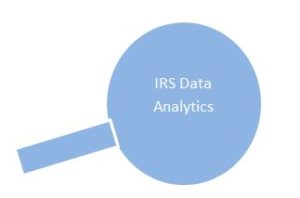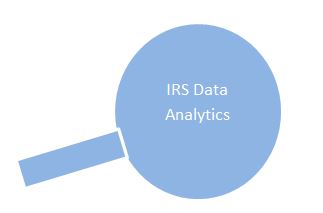IRS Detection of Tax Fraud Proliferates
Data Analytics is the Key
 During the last decade, the Internal Revenue Service has been limited in its ability to ferret out tax cheats, due, in large part, to a 17% cut in its budget in 2010 as well as a 14% reduction in its labor force. Despite dwindling monetary and human resources, the Agency has been able to keep up with its investigations thanks to advance in information technology.
During the last decade, the Internal Revenue Service has been limited in its ability to ferret out tax cheats, due, in large part, to a 17% cut in its budget in 2010 as well as a 14% reduction in its labor force. Despite dwindling monetary and human resources, the Agency has been able to keep up with its investigations thanks to advance in information technology.
While budget cuts have certainly hampered traditional methodologies for selecting returns for examination (for example identification of mathematical errors, or mismatches in information provided by taxpayers and third parties), the IRS has a new weapon in data analytics.
The IRS has been using its data analytics platform to uncover potential tax cases, as well as detect undeclared offshore assets. The platform consists of developing models using algorithms to assist in areas of tax noncompliance.
In 2018 the IRS Criminal Investigation Annual Report (the “Report”) cited the formation of the Nationally Coordinated Investigations UNIT and its early success in lead generation based upon these technological developments. The success of data analytics in the detection of criminal tax fraud is further evidenced by the 400% increase in the detection of tax fraud. According to the Report, the IRS Criminal Investigation Division experienced an increase from $2.5 billion to $10 billion in tax fraud.
The impact that the new technologies have had and will continue to have on IRS investigative initiatives and collaborative enforcement efforts by the United States and its partners can’t be ignored. In 2018 the Internal Revenue Service established a new international financial crime group in the Washington DC field office and also memorialized the creation of the Joint Chiefs of Global Tax Enforcement (“J5”). Other areas the Criminal Investigation unit is focused on are: employment tax and refund fraud, and identity theft.
As the IRS continues to develop its technology platform, taxpayers should expect increased scrutiny. Of particular importance is the IRS current emphasis on international tax compliance and enforcement.
How IRS is using technology in curbing tax evasion
In response to the rapid proliferation of global financial crimes, the IRS Criminal Investigation unit has stepped up its game. Some of the things the IRS has been able to do is to have its Criminal Investigation Special Agents track the proceeds of financial crimes by using cutting edge technology. Also, together with sophisticated investigative work, the IRS case selection process has significantly been enhanced.
The IRS use of data in its investigation of tax cheats is also evident in the Government’s data mining of public information from sources such as Facebook, LinkedIn, Twitter and Google and its use of other automated computer programs to track taxpayer activity.
Finally, the impact of recent cyber breaches, such as the Panama and Paradise Papers cannot be over emphasized. In the event of a leak or security breach, the Government has the absolute right and the ability to collect taxpayer and other relationship data which can later be used to identify non-compliant taxpayers. In these instances, there is no expectation of privacy.
The role of data analytics as an investigative tool cannot be overstated. Despite a shortage of Special Agents in the Criminal Investigation Division, the IRS achieved a 91.7% conviction rate for the fiscal year 2018. Working smarter and more efficiently, not typically associated with government agencies, is definitely paying off.
However, the IRS data analytics platform does have its critics, who maintain that the new practices violates federal law and may also constitute discrimination. In addition, concerns have been raised that the IRS data collection practices may be used for nefarious purposes such as political targeting, data breaches and the misuse of information. While the above concerns may be legitimate, it is unlikely, that the IRS will capitulate at any time soon.
Consequently, taxpayers need to make sure they accurately report all items of income and expenses, particularly those taxpayers who self-report (self-employed and small business owners). In addition, taxpayers should be cautious with their use of social media or other platforms, since that information is free for the taking. That selfie of you and your new Porsche on Facebook is probably not a good idea.





